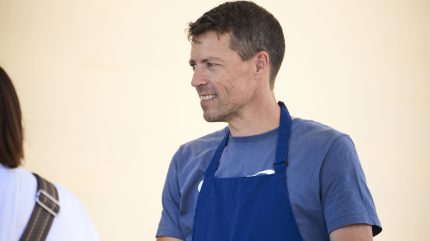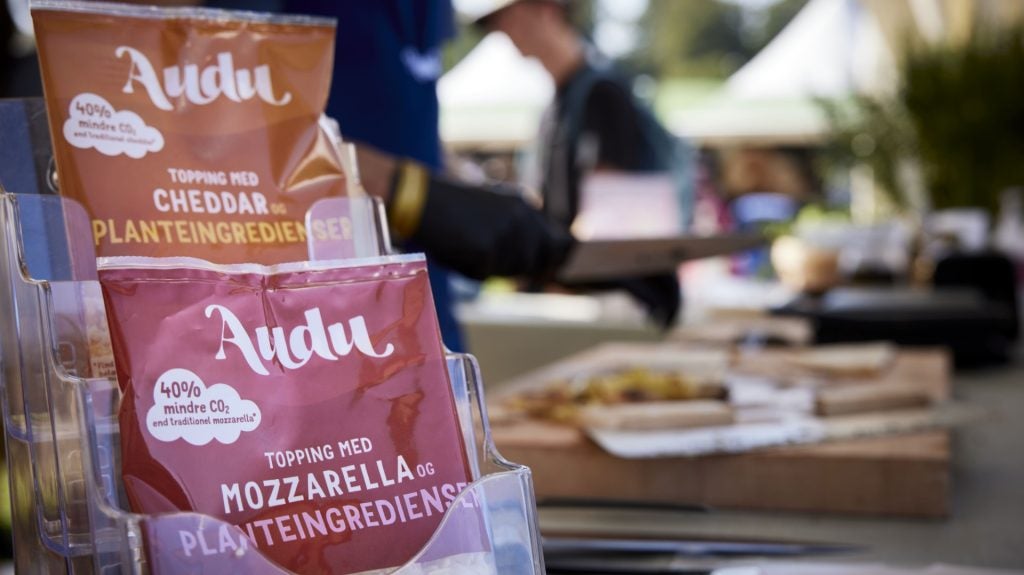
PlanetDairy in Denmark is embarking on its next development phase with a plan to scale growth in hybrid cheeses by entering the private-label market.
Set up by three dairy industry executives in 2022, the company has a range of products on shelf in select European retailers, combining traditional dairy ingredients with plants through a precision fermentation process.

Discover B2B Marketing That Performs
Combine business intelligence and editorial excellence to reach engaged professionals across 36 leading media platforms.
PlanetDairy’s Audu brand offers hybrid versions to mozzarella and cheddar, available in block, sliced and grated formats.
Jakob Skovgaard, one of the co-founders and CEO, chats with Just Food’s Simon Harvey on the plans and challenges ahead.
Simon Harvey (SH): What was the thinking behind the Audu hybrid cheese brand?
Jakob Skovgaard (JS): What we are trying to be is just another cheese brand that tastes like dairy, performs like dairy and costs the same as dairy.
We’re not the enemy of dairy and trying to change. We’re just trying to apply common sense and new science to combine craftsmanship and create some great products.

US Tariffs are shifting - will you react or anticipate?
Don’t let policy changes catch you off guard. Stay proactive with real-time data and expert analysis.
By GlobalDataMost of our team worked in the dairy industry for some years and we are quite passionate about dairy products. Personally, I’m very passionate about cheese, and am a heavy consumer of cheese.
SH: What has the reception been like for the Audu range following the Smug hybrid dairy brand launch last year by Kerry Group?
JS: We stay close to Kerry and have been exchanging insights and ideas along the way, and still are. We had an overwhelmingly positive reception by retailers generally and gained wide distribution in the Danish market very quickly.
We’ve also entered Sweden and Finland and there hasn’t been a door that we’ve knocked where we’ve not been let in, more or less.
From a consumer point of view, it’s always a tall order to launch a new product and new brand through a new segment but it’s rotating and developing positively.
SH: Are you also making product for other companies?
JS: Yes we are. We are now entering a phase where it’s more about scaling via private-label deals and industry contracts.
We see it more as a proof of concept where we develop our technology, we have the products and we establish the supply chain. But the way to have an impact on CO2 is to go into the retailer’s brands and also into food manufacturing. Retailers and food manufacturers are really keen on buying into the idea of reducing CO2.
We already work with some of the very large pizza makers, some of the lasagna ready meals manufacturers and some bakeries too.
SH: Is the interest more around a new concept or are the CO2 considerations a big part of it?
JS: I think climate awareness and the positive attitude to make positive steps and contribute in the right direction to make climate-conscious choices is definitely there but it has to be at no compromise. You have to ensure the taste is okay, the functionality is okay, the nutrition is okay, and there’s no price premium.
It’s 40% less CO2 emissions compared to a traditional dairy cheese and consumers find that interesting. We take a traditional cheese process and the craftsmanship, then we combine some plant ingredients such as pea protein, potato, rapeseed and coconut oils, and we get lower CO2 emissions. And we’ve managed to find a way to treat the plants so that the cheese tastes like dairy, melts like dairy and has the functionality.

SH: How does the mozzerella SKU perform in terms of stretch and melt?
JS: We are 90% there. Most people, in normal, everyday applications, they don’t see the difference or experience the difference from a taste point of view.
Over the last decade or so, you’ve seen a lot of plant-based products and a lot of hype around that, but it’s never really grown to any significant amount. And especially in cheese, it’s still less than 1% of the category in most countries. As far as I know, I think the UK is probably the most developed, and it’s about 2% of the category, but there’s still 98% missing.
And even in milk drinks or in yogurts, where it’s more developed, there’s still 80% or 90% of people that are preferring traditional dairy, and those are the people we are trying to cater for and give them an alternative which can be more sustainable.
SH: If you have cracked the taste code and can compete effectively on price, I guess hybrid cheese is a no brainer?
JS: It’s not easy to make fantastic hybrid products. There’s a scale of how close you are to dairy? How close are you to plants? And what’s the fraction of each element that you put into your recipe?
We’re trying to go as far as we can and get as high a CO2 reduction as possible but to never compromise on the taste and the functionality. We are dairy people, dairy lovers, and we want consumers to have that experience.
SH: The Audu line-up is currently four SKUs, is that correct?
JS: That’s what we have in the market. I would say the shredded cheese is doing well, I’m happy about that. The cheese block and the slices, we are in an improvement phase on that. I think here the bar is higher. And if I’m completely honest, we haven’t lived up 100% to the no-compromise. Depending on taste preference, it’s a very mild, simple piece of cheese.
SH: Does PlanetDairy have plans to expand to other European markets?
JS: We are speaking to a number of retailers across Europe and basically talking to them about the idea of hybrid dairy, the idea of a cost-competitive alternative which can help them meet their CO2 targets. We now have three years of experience in life-cycle analysis, plant-based ingredients, the science around fermentation and we have a roadmap towards applying more advanced precision fermentation and stuff like that further down the road.
We are putting cheese alternatives into play in private-label deals and very soon we’ll be ready with a wider portfolio as well. Then we work with production partners – and some of them are already supplying some of the same retailers with private label – but we then implement our unique recipes and our approach with them and set that up with retailers or with the likes of the Dr Oetker, Domino’s or some of the lasagne manufacturers.
SH: What are your plans for expanding the range? Kerry, for instance, launched cheddar cheese, butter and milk hybrids?
JS: We will go down a similar route. At some point, definitely milk, definitely yogurt, you name it. I would say crème fraîche, skyr, high-protein yogurt, high-protein milk drinks and cheeses.
Cheeses are a fragmented and complex category. Our sliced cheeses are a Danish variant. Obviously, we need a cheddar, we need a Gouda, cream cheese, soft cheese, and salad cheese as well. And for a lot of this, we already have prototypes and are ready to implement production and scale up.
SH: How are sales progressing?
JS: Growth is going to come from the private-label deals and industry contracts, which are soon to kick in, and then all of a sudden, we’re talking about five times the revenue on a month-by-month basis from accumulated revenue to date of around €800,000 ($905,057).
Sometimes we talk about the car industry as a parallel or an analogy
SH: What are the longer-term ambitions?
JS: We are super ambitious. We’ve had a phase now where some things have taken a bit longer to get the production partnerships up and running. Now we are looking at a milestone within the next six to 12 months where a few of these bigger contracts we are negotiating will kick in, which will bring us to somewhere around €5 million revenue quite quickly.
We do have an ambition in the next phase to raise a significant amount of money and scale further, and then our star, if you wish, is €75m.
SH: Has the business been self-funded so far?
JS: It’s a combination. As three experienced dairy industry guys we started and funded the business together. Then we have had investments of around €2.5-3m from both soft funding programmes and external family offices (private equity).
SH: Do you think hybrid dairy products have a better chance of success than full-blown alternatives given the challenges the latter have encountered?
JS: I definitely think so. Sometimes we talk about the car industry as a parallel or an analogy. The first electrical cars were not that impressive and many people were disappointed but they kept improving. Then the hybrids came in as a stepping stone to help bridge the gap and enable consumers to start on that journey.
And I think it’s a bit similar here. I’m very convinced science will take us very far. Before we started PlanetDairy, I spent a year working with Remilk in Israel. They are producing an exact copy of the milk protein and the milk fat molecule in a fermentation tank via precision fermentation. It still needs to be scaled up, it needs to come down in price, and it needs to be approved by food authorities. That’s all going to take some time but offers opportunities for us in the future. Our vision and goals one day are to go all the way and have real dairy with no cows.
But even then, we believe it’s going to be most likely hybrid products because when you use this technology, you build your products from the bottom up and you need this protein and you need this fat, for instance.





